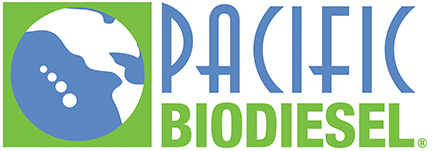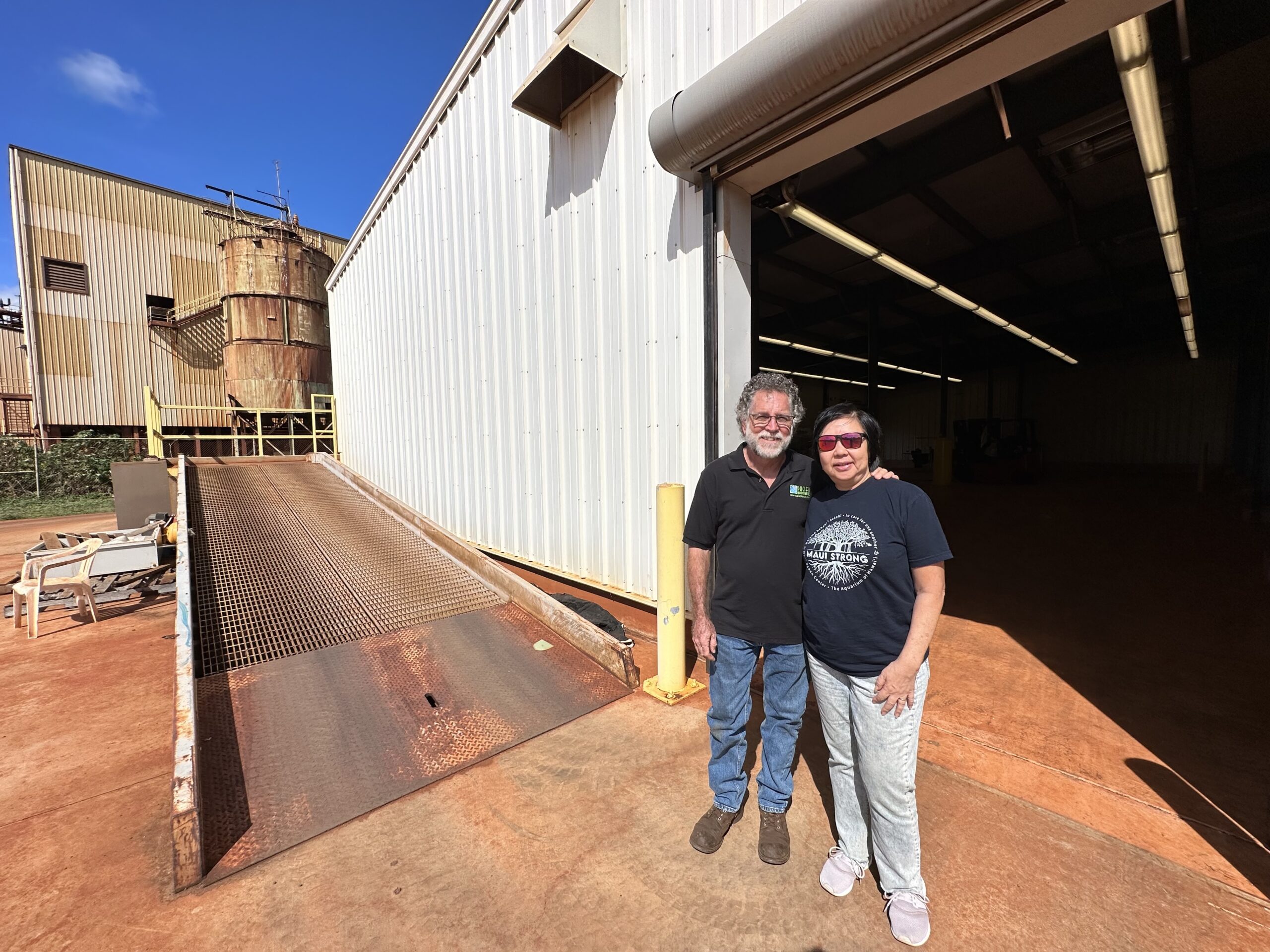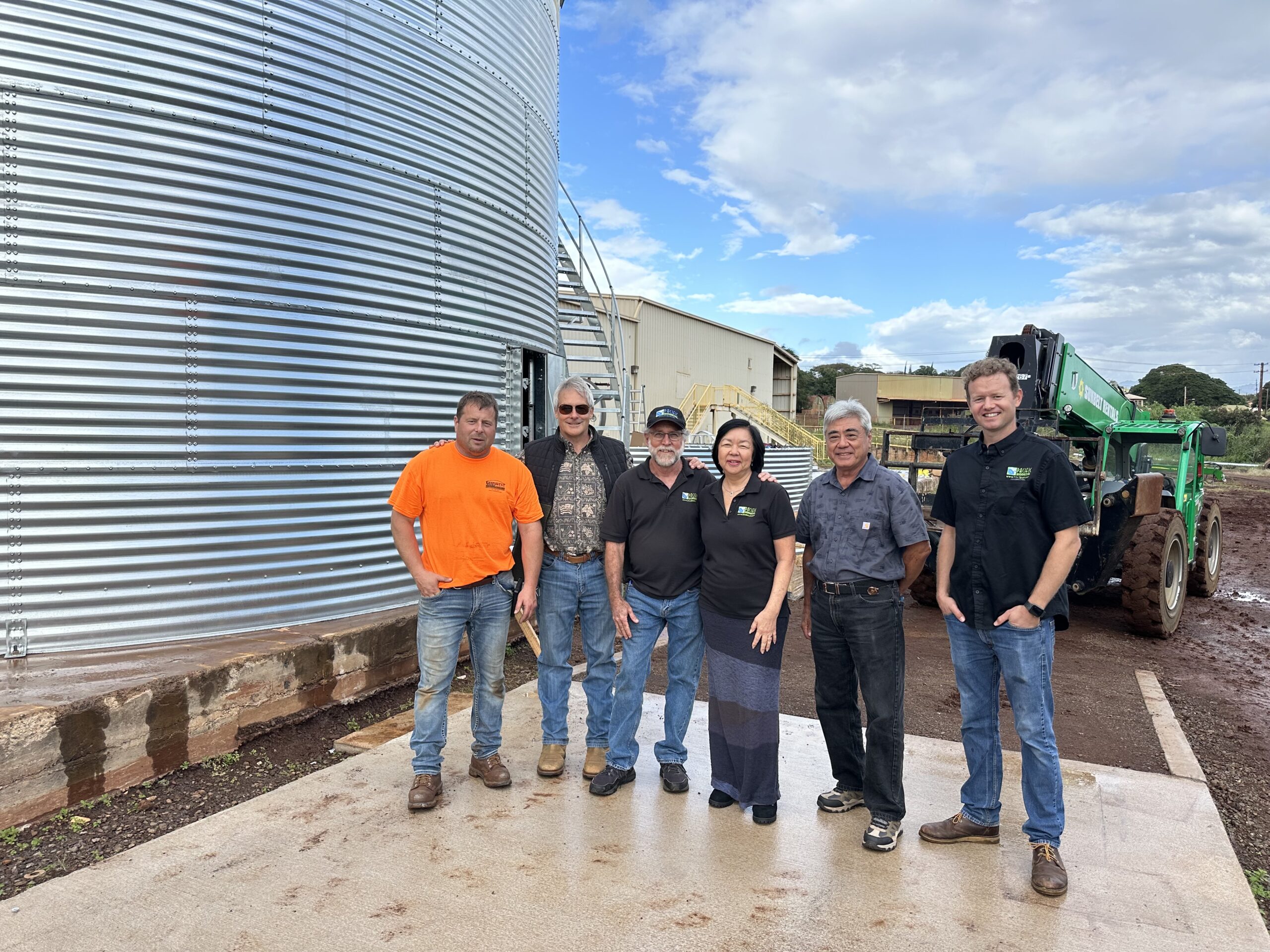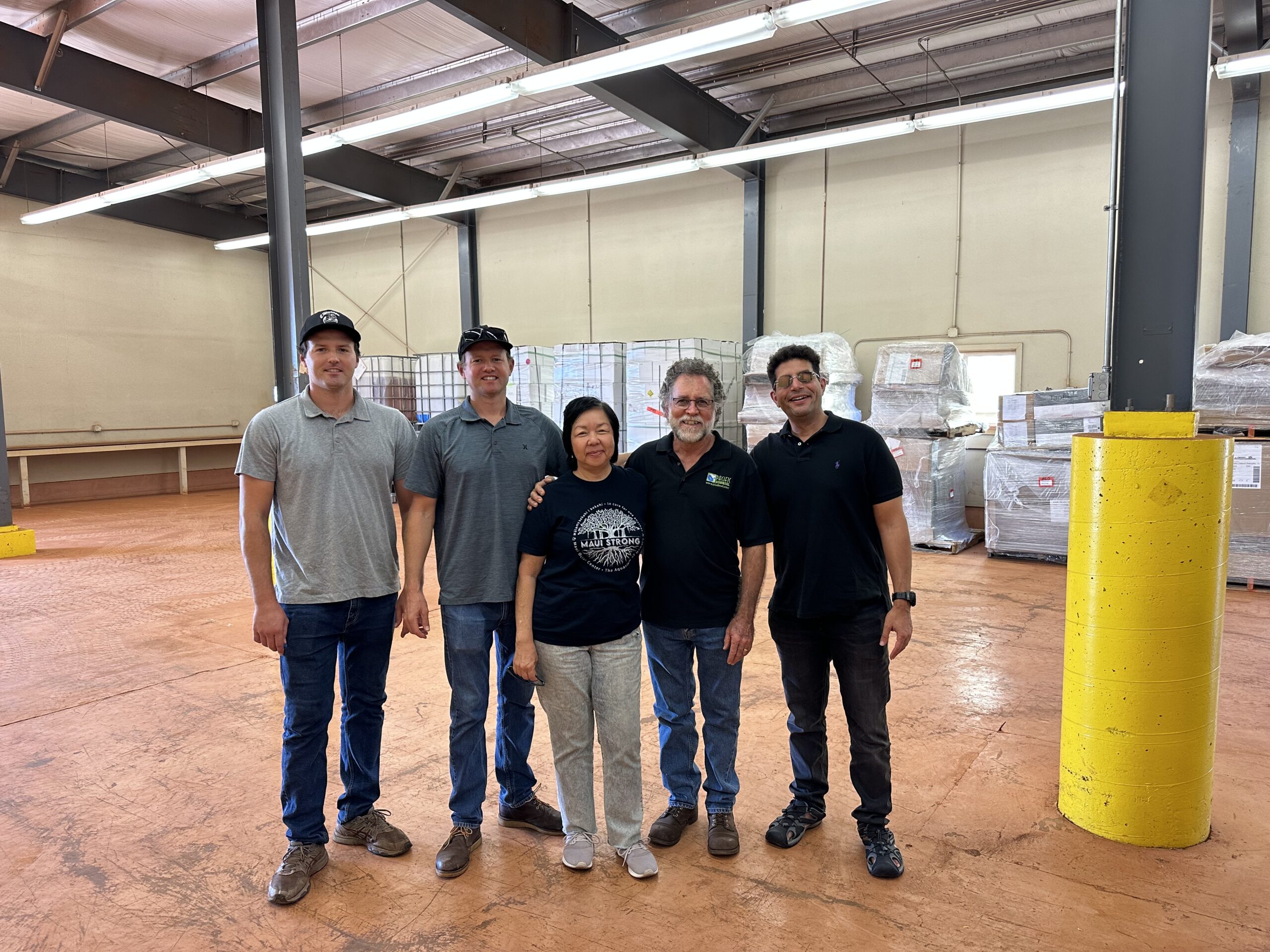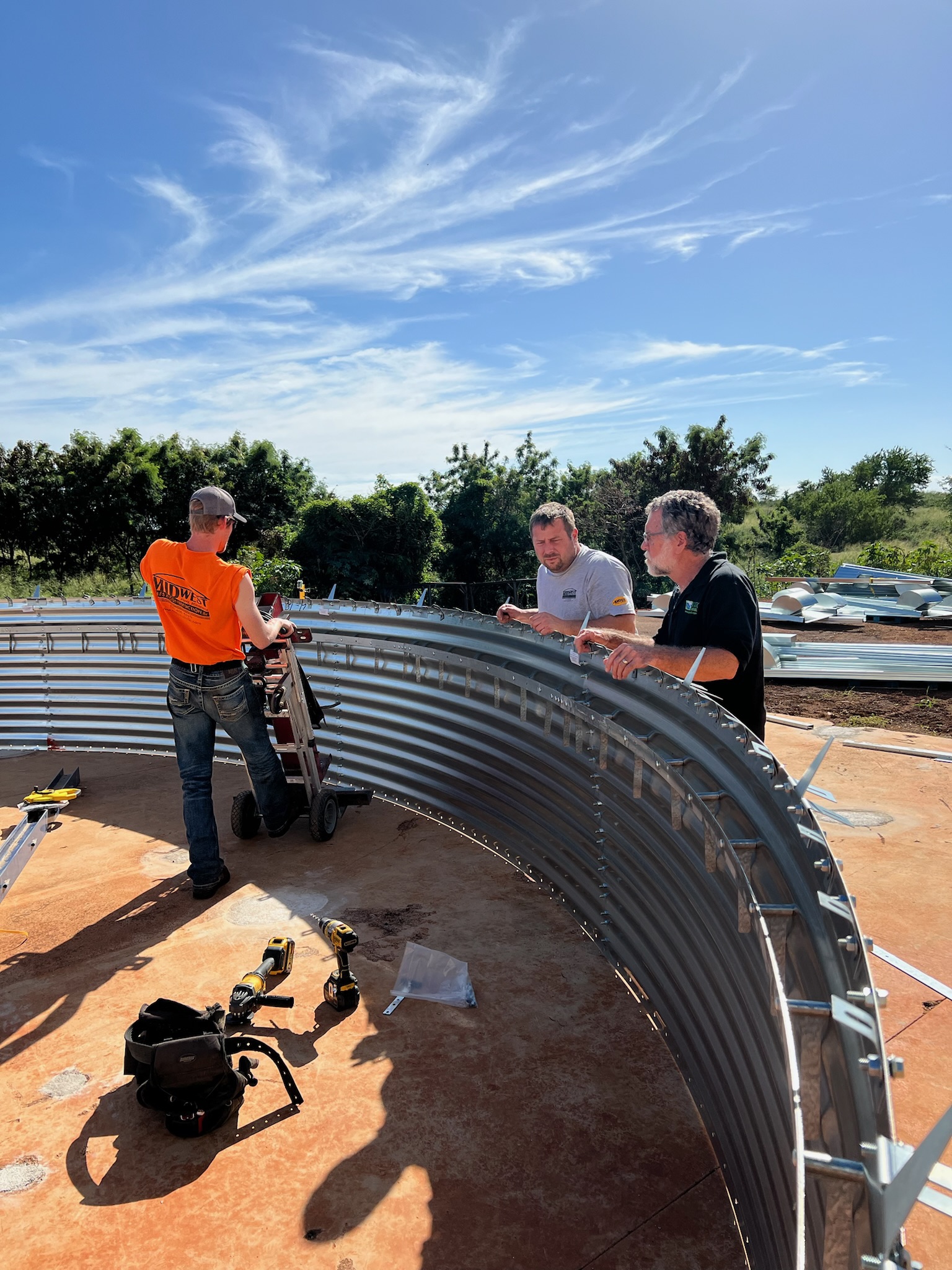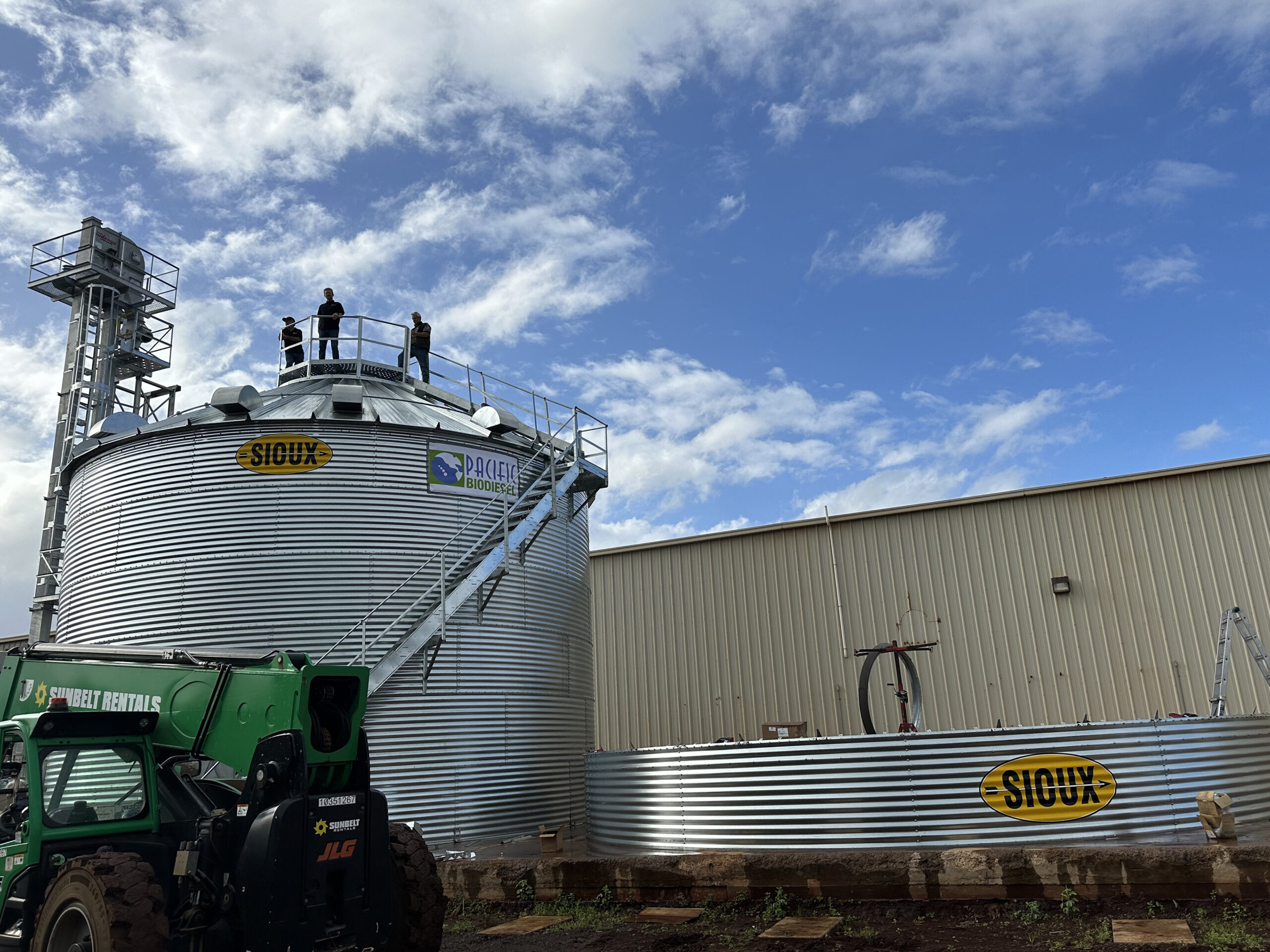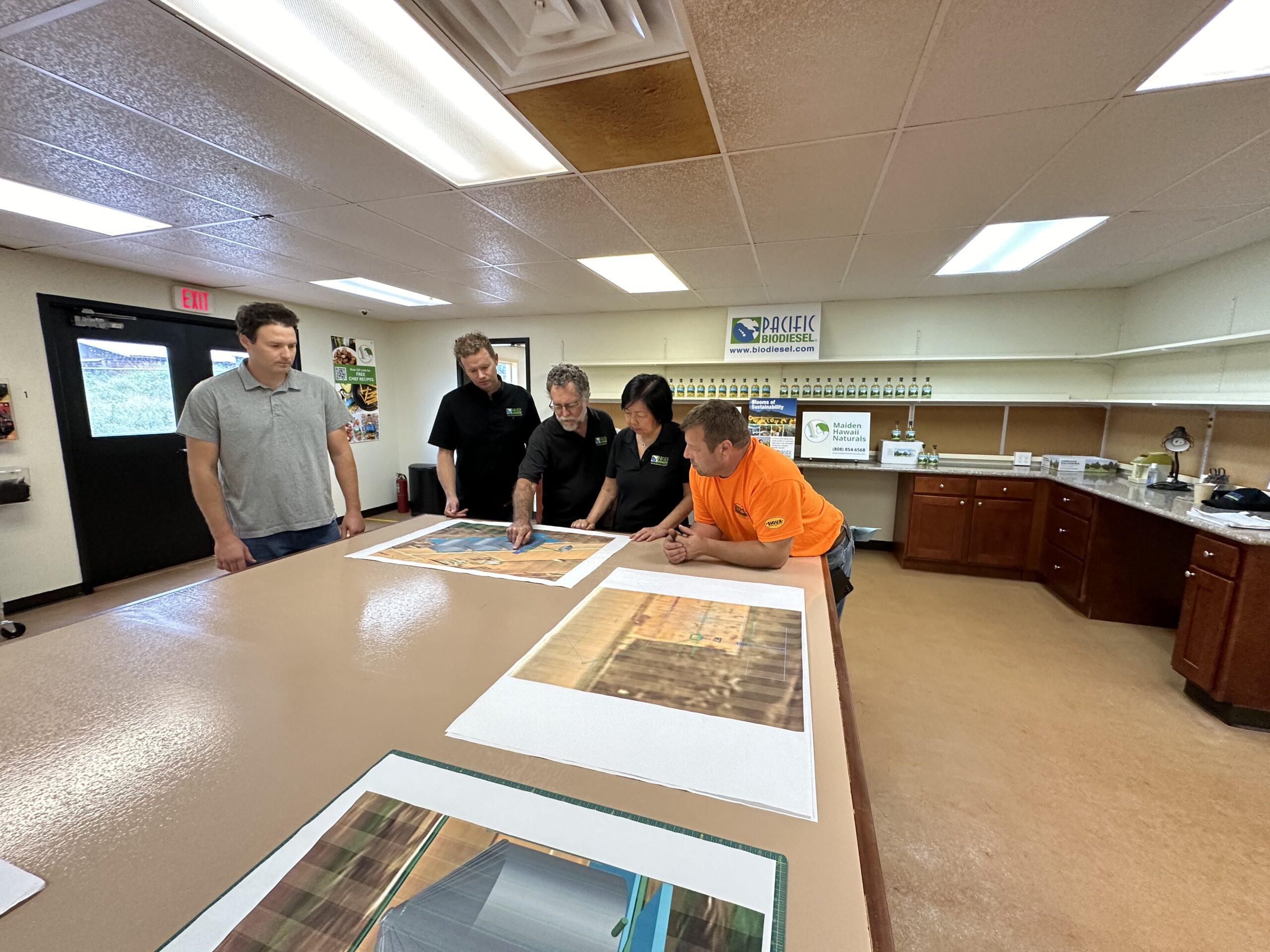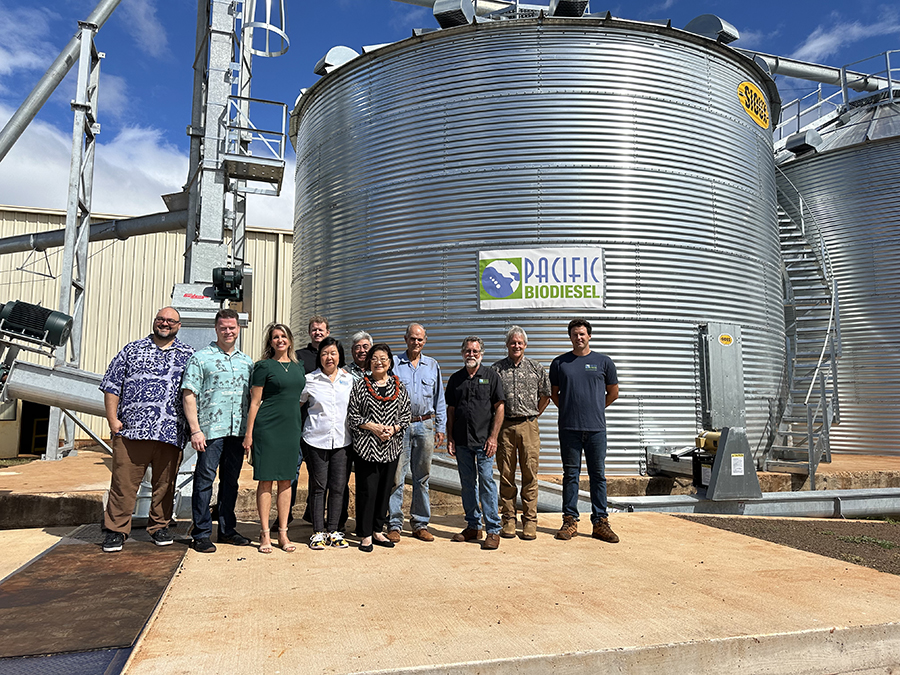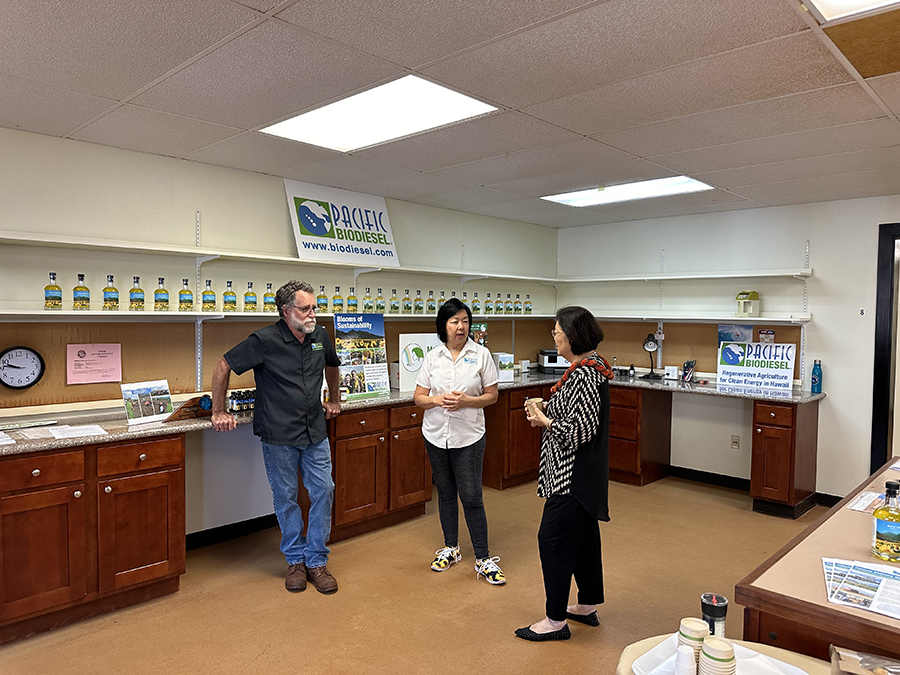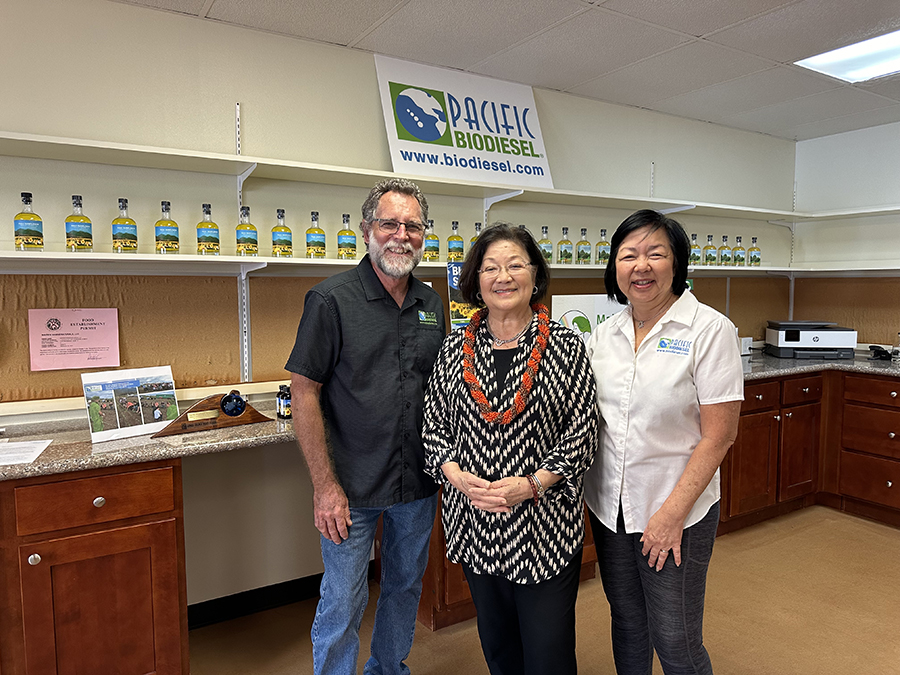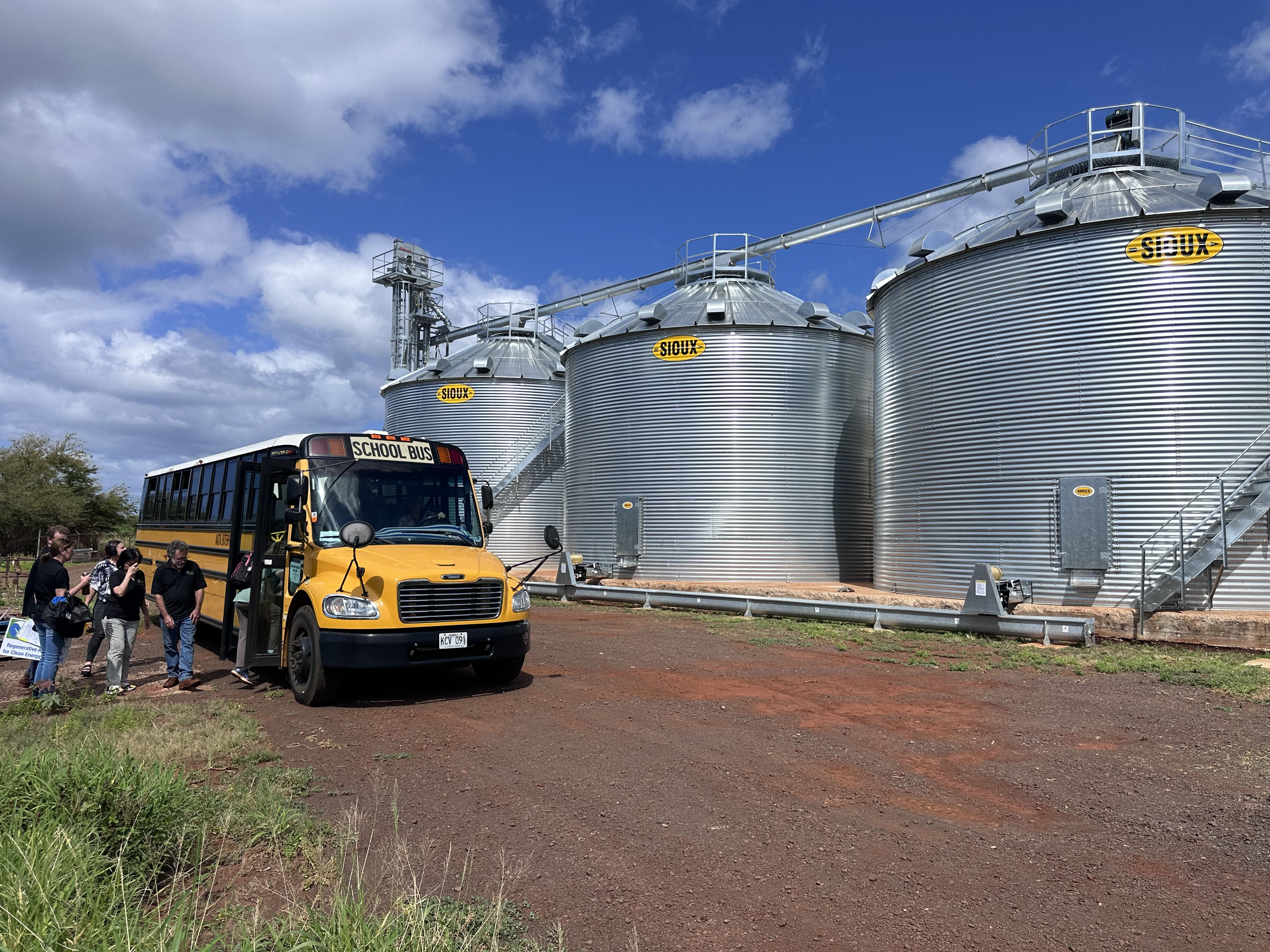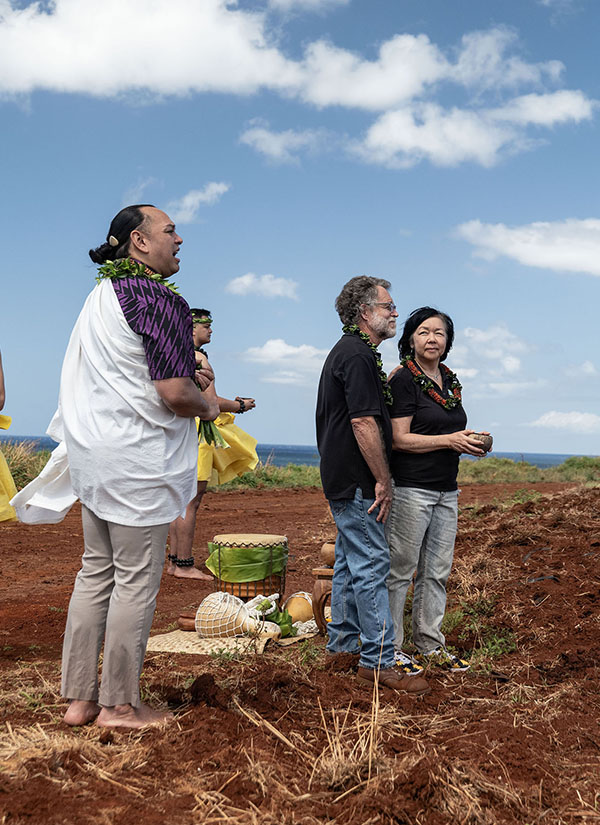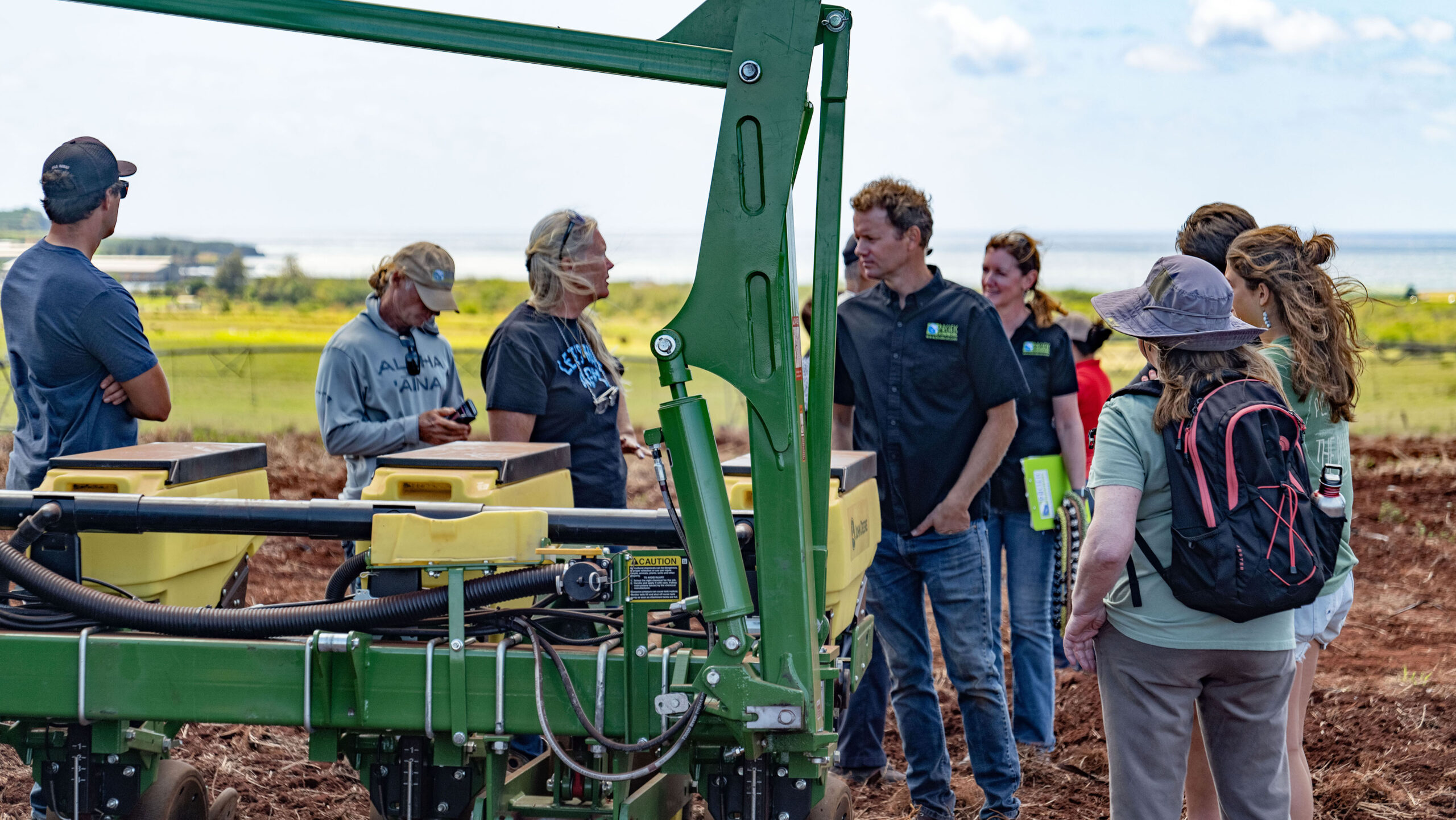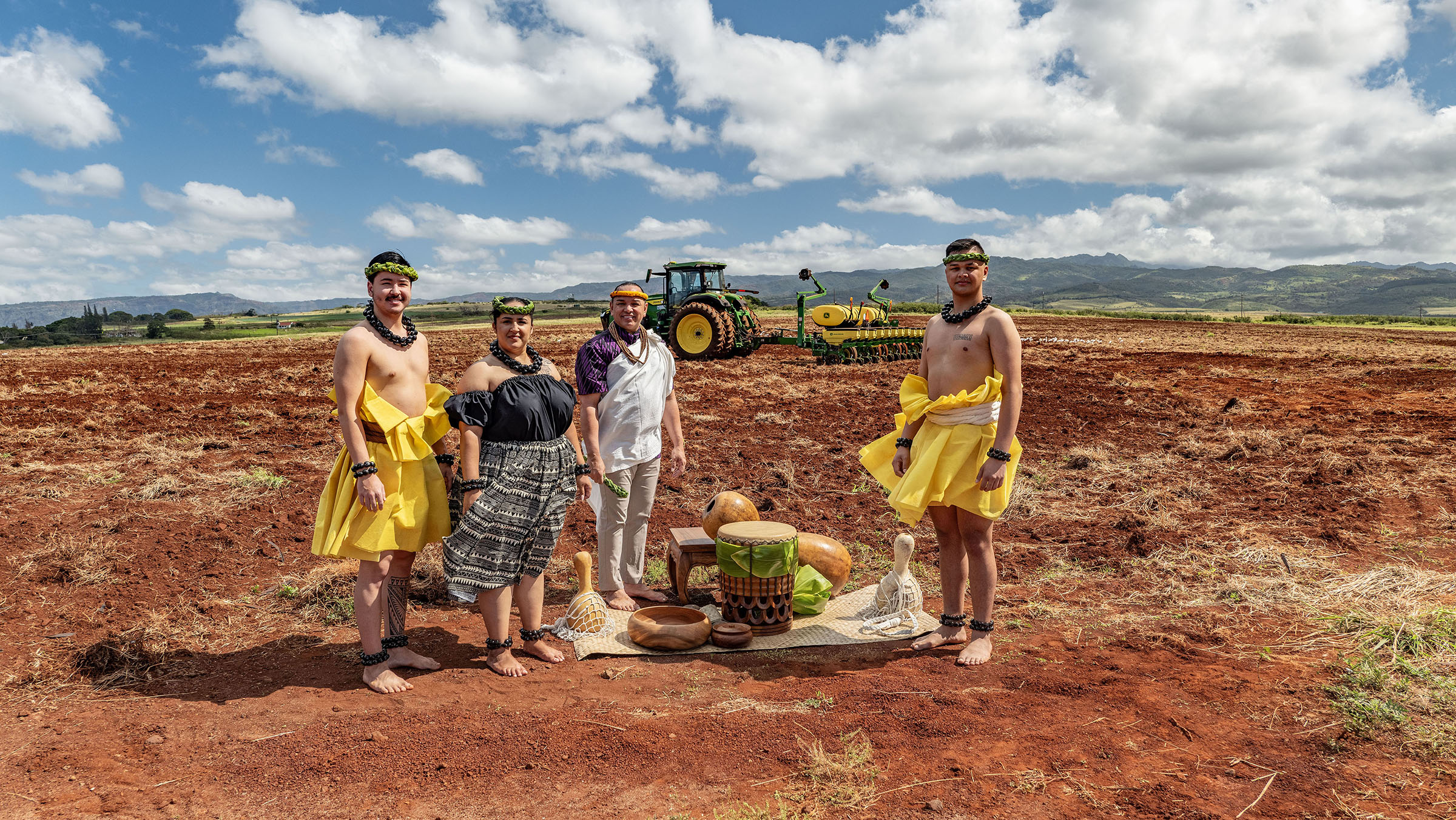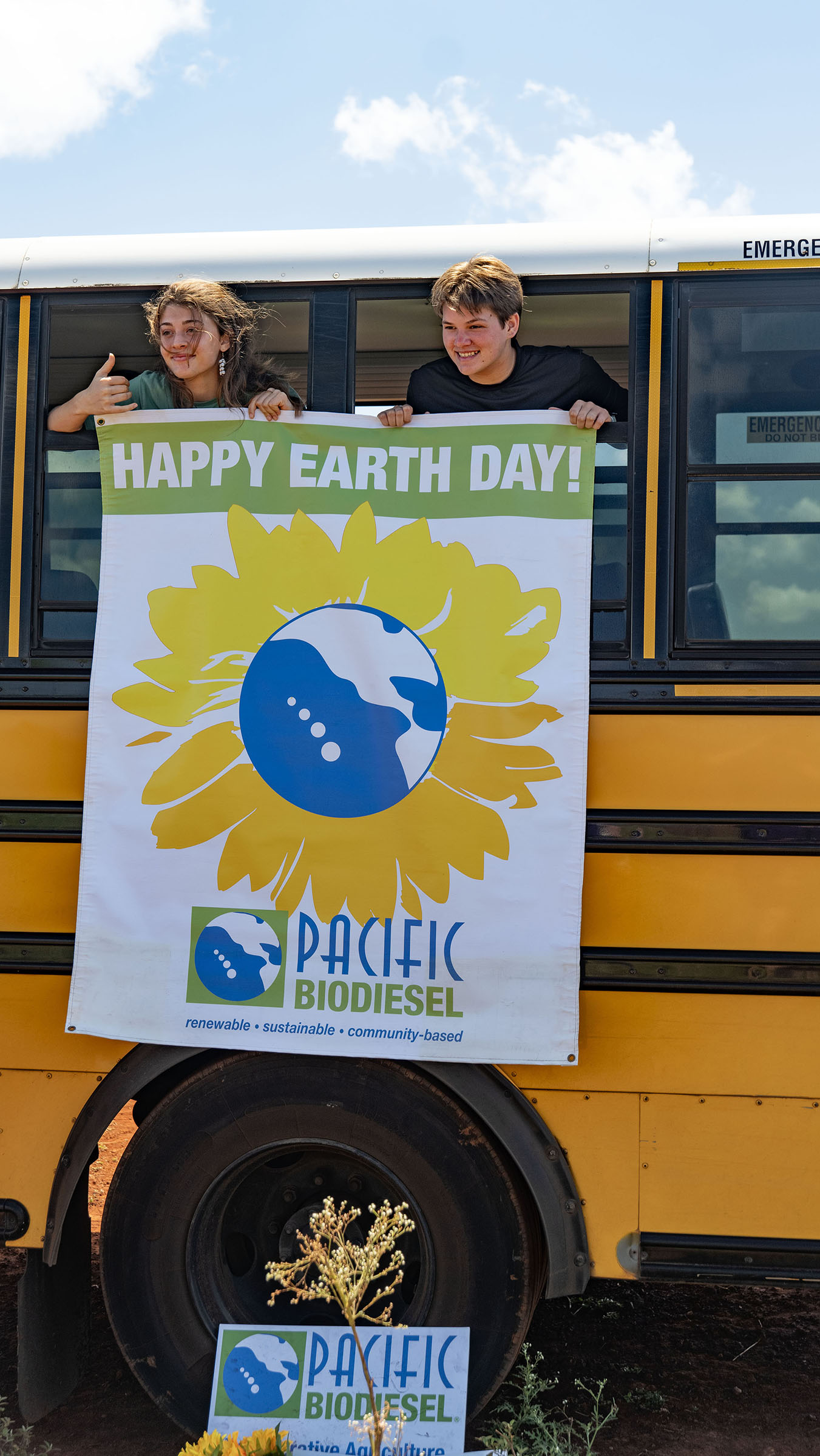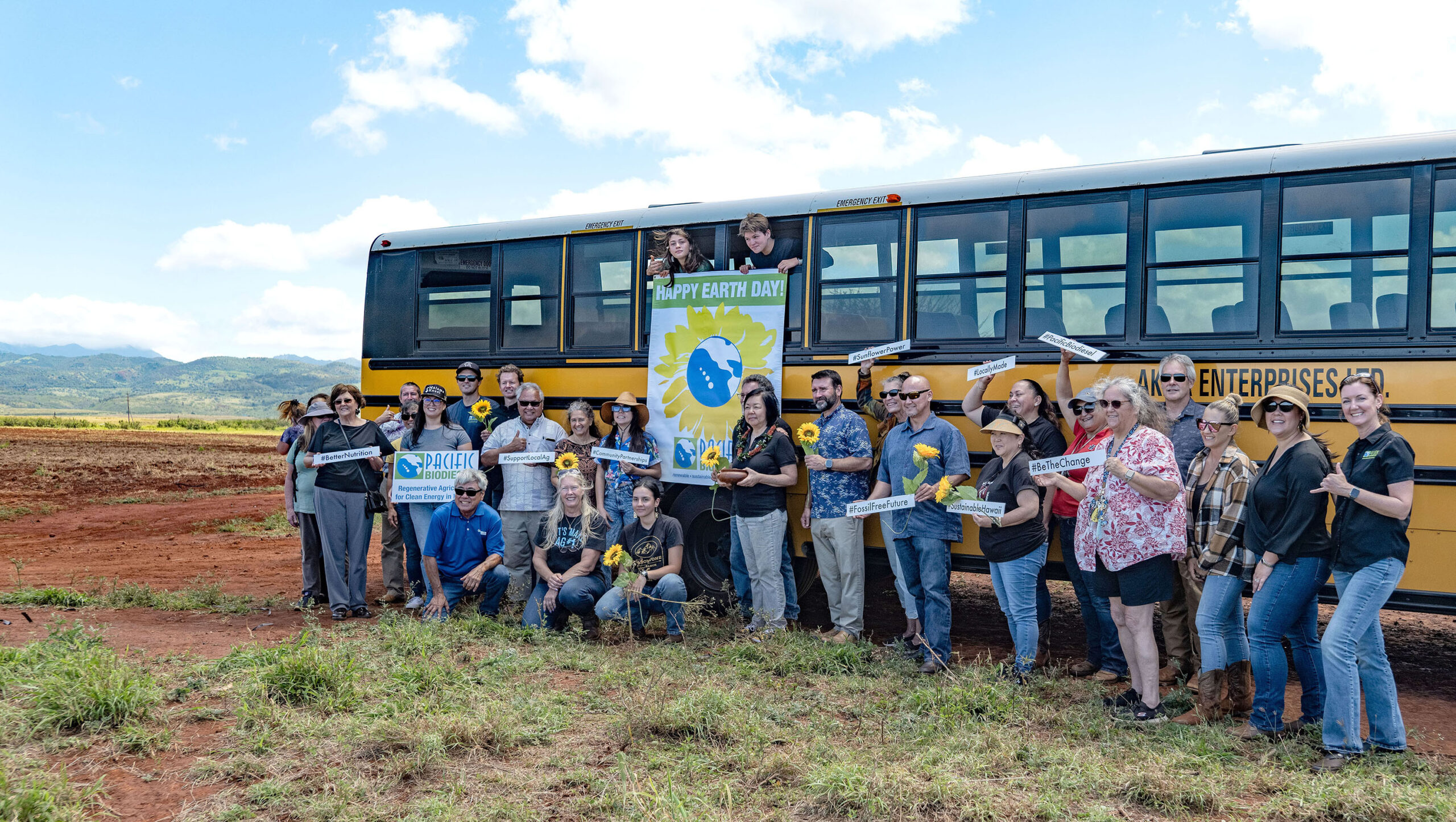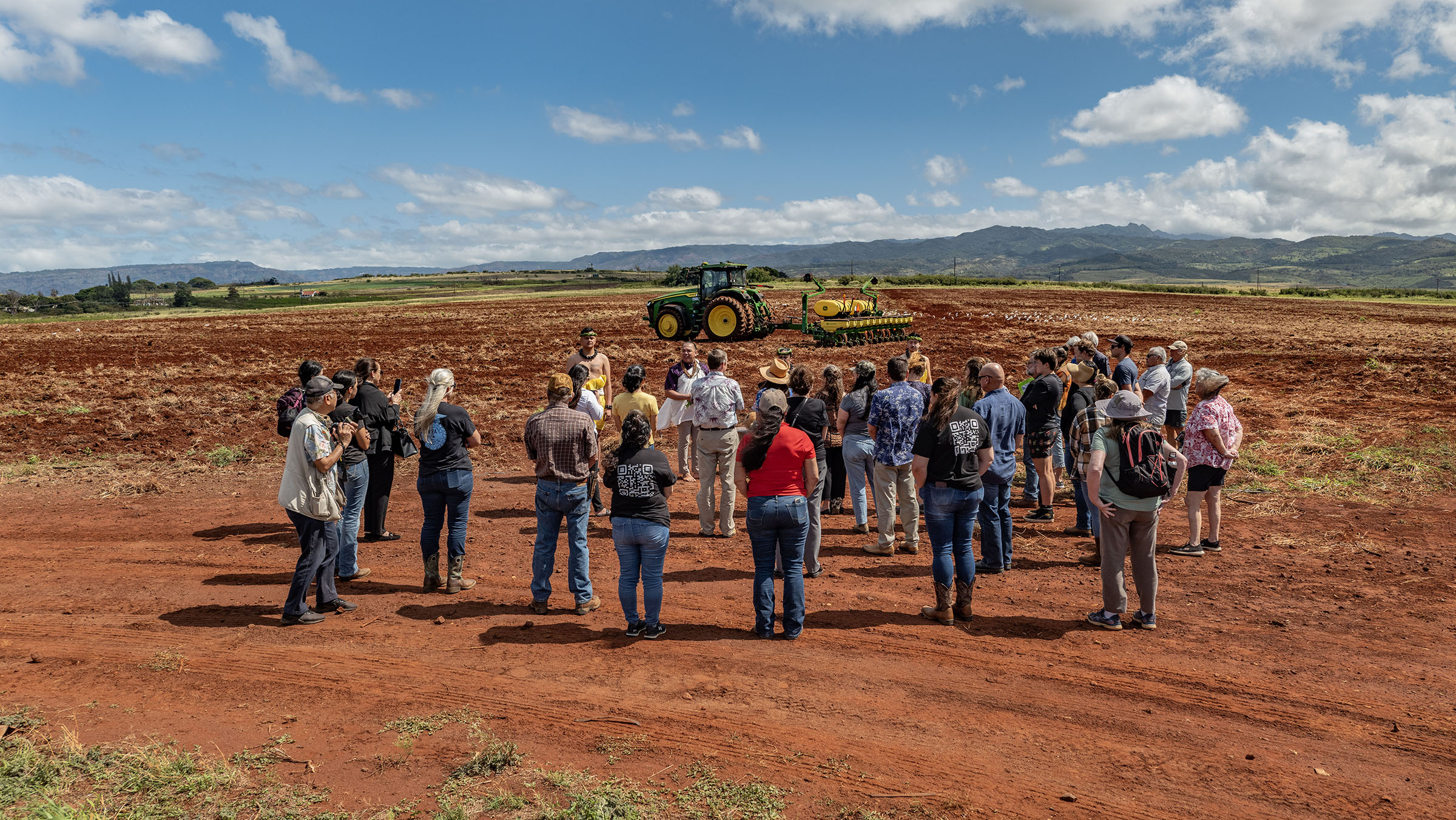Growing Hawaii’s Circular Economy:
Regenerative Agriculture for “Food Then Fuel”
Regenerative Agriculture for “Food Then Fuel”
Pacific Biodiesel has expanded its agriculture operations to Kauaʻi – demonstrating a model of regenerative agriculture and renewable energy in our island state that’s helping to create local jobs, fight climate change, support energy security and food sovereignty, and grow Hawaiʻi’s circular economy.
PLEASE NO TRESPASSING. The sunflowers and other crops farmed by Pacific Biodiesel on Maui and Kauaʻi are located on private property. For safety and security reasons and in accordance with the private landowners’ policies, no public parking or unauthorized access to the farm sites are allowed. Learn more and sign up for our company newsletter here and follow @pacificbiodiesel on social media for updates on future farm tours and other announcements. Mahalo for your cooperation!
Pacific Biodiesel, America’s longest operating biodiesel company, has been producing biodiesel in Hawaii for nearly 30 years and is an internationally respected leader in renewable fuels. Now this pioneering company is spearheading a significant expansion of agriculture for food and renewable energy in Hawaii that’s helping to create jobs, fight climate change, support energy security and food security, and grow Hawaii’s circular economy.
Bob and Kelly King founded Pacific Biodiesel on Maui in 1995 where they created the first retail biodiesel pump in America. Their clean, renewable biodiesel is produced by recycling used cooking oil from restaurants statewide. In 2017, the Kings began farming sunflowers and other cover crops on their 115-acre farm in Maui’s central valley. Using regenerative farming practices, their company Maiden Hawaii Naturals produces culinary oils for restaurants and consumers and the used cooking oil is later recycled by Pacific Biodiesel to produce its 100% renewable fuel for Hawaii.
In January 2024, Pacific Biodiesel announced its expansion of operations to Kauai as part of a multi-year agreement with the U.S. Army Corps of Engineers (USACE) Engineer Research and Development Center’s Construction Engineering Research Laboratory for a project that will demonstrate renewable biofuel produced in Hawaii from multiple locally grown oilseed cover crops. Supporting the U.S. Army Climate Strategy, this project will produce a prototype solution for sustainable biofuel as well as the agricultural model to produce the renewable fuel in Hawaii.
Building upon Pacific Biodiesel’s previous research in its 2011 Hawaii Military Biofuel Crop Project, this project will demonstrate farming at a larger scale of 1,000+ acres and will include sunflowers and other crops in rotation with food crops. The production model will include expanded production of culinary oils and other value-added food products, meal for animal feed, biodiesel, and co-products from biodiesel production such as glycerin and potassium salt cake, which has potential as non-petroleum fertilizer for local agriculture.
“At its core, this project supports Hawaii’s circular economy, using local resources and creating local jobs to produce products for our local community while urgently fighting the effects of the climate crisis,” said Pacific Biodiesel President Bob King.
This project is based on Kauai, where Pacific Biodiesel is supplying its biodiesel to KIUC as a source of renewable energy supporting the Kauai utility’s accelerated pathway to 100% renewable electricity production by 2033, more than a decade earlier than the State of Hawaii’s mandated timeline of 2045.
Learn more about Pacific Biodiesel’s community-based sustainable agriculture and renewable energy model below:
- Download the Pacific Biodiesel Company Fact Sheet
- Download the Pacific Biodiesel HMBCIII Project Overview
- Read about Pacific Biodiesel’s Expansion of Agriculture Operations to Kauaʻi
- Read Kelly King’s editorial in Biobased Diesel (Winter 2024)
- Download Pacific Biodiesel’s Vision – A realistic pathway for local biodiesel production to support Hawaii’s mandate for 100% renewable electricity production by 2045
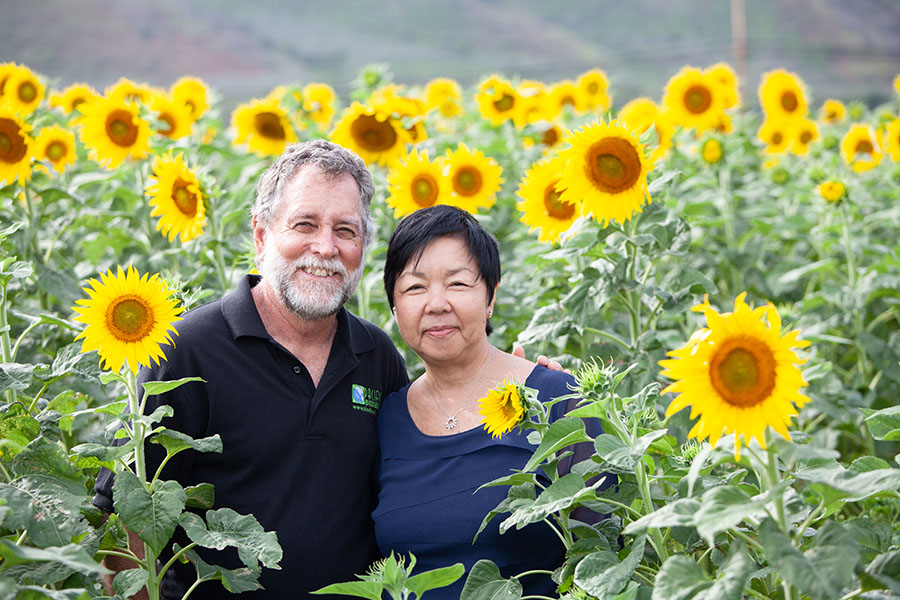
Bob and Kelly King, who founded the internationally recognized renewable energy company Pacific Biodiesel on Maui in 1995, stand among the blooming sunflowers in their central Maui farm.
Guests Tour Pacific Biodiesel’s Kauaʻi Agriculture Operations and the Island’s First Field of Blooming Sunflowers
KAUMAKANI, HAWAII (July 12, 2024) – The Pacific Biodiesel team welcomed guests for special private farm tours on Friday, July 12th at its first field of blooming sunflowers on Kauaʻi. This video is a recap of the day, which included a tour of the company’s new crushing mill at the Gay & Robinson, Inc. property in Kaumakani, and a visit to the 100 acre blooming sunflower field via a school bus shuttle provided by Hawaii Agricultural Foundation.
Click here to learn more about the day’s events.
Pacific Biodiesel Welcomes Community Leaders & Local Students for Blessing of the Company’s First Sunflower Field on Kauaʻi
KAUAʻI, HAWAIʻI (April 23, 2024) – In commemoration of Earth Day, Pacific Biodiesel Founders Bob and Kelly King welcomed community leaders and local students on a tour of the company’s new crushing mill and expanded agriculture operations, followed by a blessing of its first sunflower field on Kauaʻi on April 22, 2024. The Hawaiian blessing was conducted by Kumu Troy Hinano Lazaro and members of his award-winning Hālau Ka Pa Hula O Hinano.
Read the press release here.
Pacific Biodiesel Expands Operations to Kauai
January 16, 2024 – Pacific Biodiesel today announced a new project on Kaua‘i as part of multi-year agreement with U.S. Army Corps of Engineers (USACE) Engineer Research and Development Center to produce a Hawaii agriculture-based biofuel. The company will be regeneratively farming sunflowers and other oilseed cover crops in rotation with food crops on 1,000 acres on the Garden Isle as part of a federally funded project to bolster Hawai‘i’s agriculture, support food and energy security, create local jobs and help combat the effects of the climate crisis. In this video, Pacific Biodiesel co-founder Kelly King explains more about this exciting endeavor that will make a significant, sustainable impact on our state.
U.S. Senator Mazie K. Hirono Visits Pacific Biodiesel’s Kauaʻi Crushing Mill and Agricultural Operations
Kauaʻi, Hawaiʻi – Pacific Biodiesel Founders Bob and Kelly King welcomed U.S. Senator Mazie K. Hirono for a tour of the company’s new crushing mill and expanded agriculture operations in Kaumakani, Kauaʻi on Wednesday, March 27, 2024. Other guests included representatives from Kauaʻi landowners Gay & Robinson, Inc., Ulupono Initiative, and Governor Josh Green’s Kauaʻi liaison.
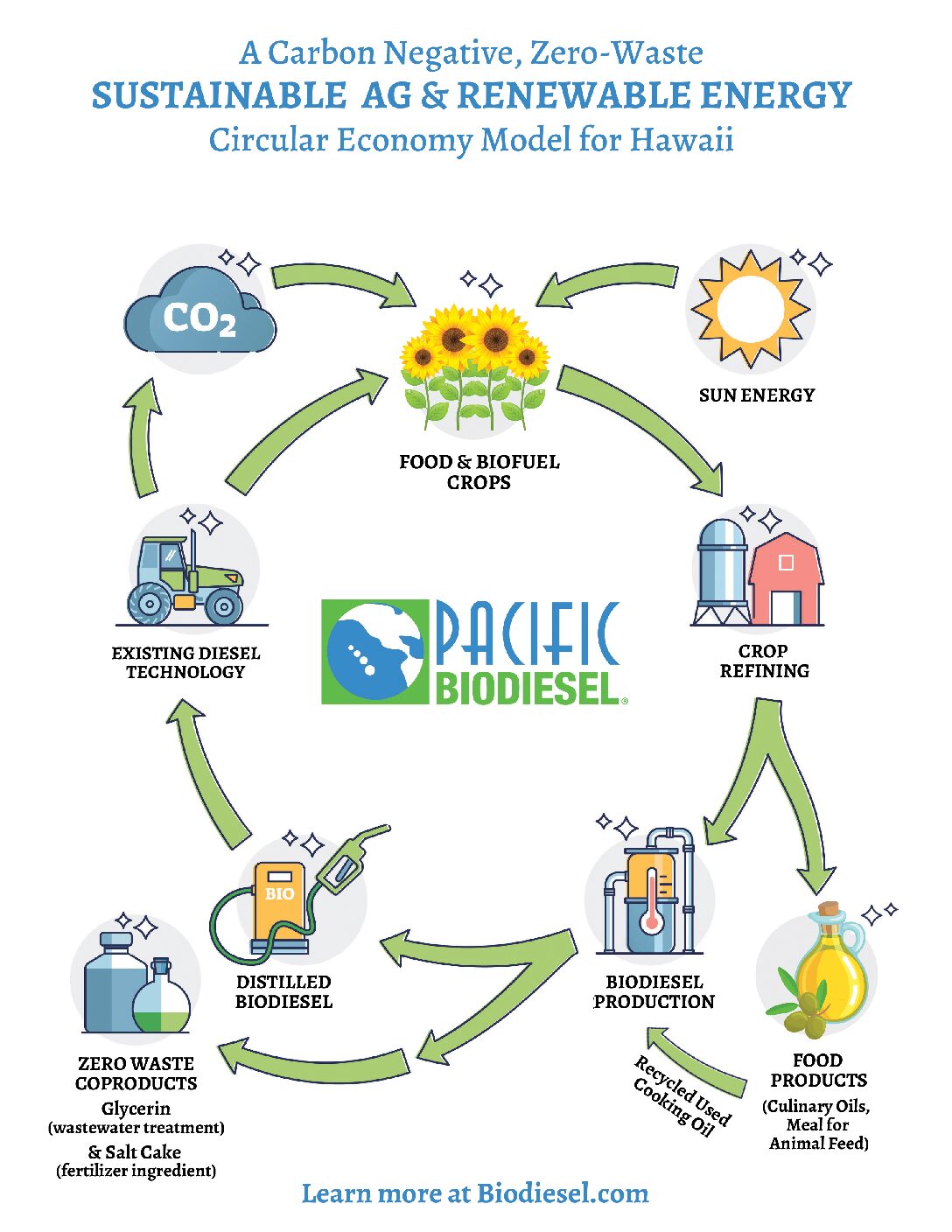
SCENES FROM OUR KAUA’I OPERATIONS
PRESS RELEASES
Pacific Biodiesel Awarded Federal Funding to Develop Model for Hawaii Agriculture-Based Biofuel
Kauai, Hawaii (January 16, 2024) Pacific Biodiesel Technologies, LLC today announced the company has expanded its operations to Kauai as part of a multi-year agreement signed last year with the U.S. Army Corps of Engineers (USACE) Engineer Research and Development Center’s (ERDC) Construction Engineering Research Laboratory (CERL) to demonstrate a renewable biofuel produced in Hawaii from multiple locally grown oilseed cover crops. Supporting the U.S. Army Climate Strategy including its priorities to enhance resilience and sustainability of the Army’s military installations, this project will produce a prototype solution for renewable biofuel as well as the agricultural model to produce the fuel in Hawaii. The effort will further validate the transition to this drop-in fuel for military application, including power generation installations. To read the full press release, click here.
Pacific Biodiesel Announces Maui’s First State-Licensed Industrial Hemp Farm
Maui, Hawaii (April 22, 2019) In celebration of Earth Day, and in a continued effort to support sustainable, community-based agriculture and renewable energy, Pacific Biodiesel Technologies (PBT) and its founders Bob and Kelly King announce today the developement of Maui’s first state-licensed industrial hemp farm, operating under the Kings’ personal entity, Imua Energy, LLC. To download the full press release, click here.
Pacific Biodiesel Celebrates First Blooms; Readies for First Harvest at its Maui Sunflower Biofuel Crop
Maui, HI (April 28, 2017) – After hosting an Earth Day community event last weekend to celebrate the first blooms in its Maui sunflower biofuel crop, Pacific Biodiesel Technologies yesterday delivered its combine harvester to the crop site to prepare for the first harvest, expected to begin in the next month when the sunflowers have fully matured. To download the full press release, click here.
Pacific Biodiesel Begins Farming the State’s Largest Biofuel Crop Project
Maui, HI (February 24, 2017) – Pacific Biodiesel Technologies this morning hosted a Hawaiian blessing to mark the beginning of the company’s scaled-up farming demonstration to grow biofuel crops including sunflowers in Maui’s central valley. The initial crop project on 115 acres will expand diversified agriculture by growing combine-harvested oil crops on land previously used for sugar cane production. This is the largest biofuel crop project in the state of Hawaii and the only biofuel farming operation in the state running on 100% renewable fuel, showcasing the company’s sustainable, community-based model of agriculture and renewable energy. To download the full press release, click here.
PRESS COVERAGE
- July 18, 2024 – The Garden Island: Enjoying the first bloom of sunflowers in Kaumakani
- July 03, 2024 – USA Today: Flower Power – From Field to Fuel
- June 21, 2024 – Biobased Diesel Daily: Hawaii’s Community-Based Biodiesel Fuels ‘Community’
- June 04 2024 – Biodiesel Magazine: Pacific Pioneer
- May 2, 2024 – The Garden Island: Biodiesel sunflowers are coming to Kaumakani
- April 24, 2024 – Biobased Diesel Daily: Pacific Biodiesel welcomes community leaders, local students to its 1st sunflower field on Kauaʻi
- March 18, 2024 – Hawaii Public Radio: The Conversation – Pacific Biodiesel expands fuel crop project to Kauaʻi, eyes building 2nd refinery
- January 22, 2024 – Chemanalyst: Pacific Biodiesel secures government grant for biofuel innovation in Hawaii agriculture
- January 20, 2024 – Biofuels Digest: Pacific Biodiesel gets funding to develop model for Hawaii agriculture based biofuel
- January 18, 2024 – Maui Now: Pacific Biodiesel awarded federal funds to develop Hawaiʻi agriculture-based biofuel model
- January 18, 2024 – Hawaii News Now: Innovative sunflower farm offers new hope for Hawaii energy and food security (VIDEO)
- January 17, 2024 – Biodiesel Magazine: Pacific Biodiesel awarded federal funding to develop model for Hawaii ag-based biofuel
- January 16, 2024 – Biobased Diesel Daily: Hope Blooms on Kauai
- January 16, 2024 – Kauai Now News: Biodiesel refinery expands operations to Kauai
- April 26, 2019 – Akaku Maui Community Media: On Earth Day Pacific Biodiesel announced their new licensed industrial hemp program (VIDEO)
- April 26, 2019 – Biodiesel Magazine: Pacific Biodiesel founders obtain license to grow industrial hemp
- April 25, 2019 – Hemp Gazette: Maui’s First Industrial Hemp Farm
- April 23, 2019 – Maui Watch: In celebration of Earth Day Maui unveils first state-licensed industrial hemp farm
- April 23, 2019 – Biofuels Digest: Pacific Biodiesel unveils Maui’s first industrial hemp farm
- April 23, 2019 – Maui News Founders of biodiesel firm unveil their own green new deal – Hemp
- April 22, 2019 – KHON2 Online Maui is one step closer to getting an industrial hemp farm
- April 22, 2019 – Maui Now Maui’s first state-licensed industrial hemp farm blessed on Earth Day (VIDEO)
- April 22, 2019 – KITV Online In celebration of Earth Day Maui unveils first state-licensed industrial hemp farm
- April 22, 2019 – Maui News Maui’s first industrial hemp farm set to begin production
- April 18, 2019 – Biodiesel Magazine: “Pacific Biodiesel eyes California as federal, local support wanes”
- April 18, 2019 – Biodiesel Magazine: “Pacific Biodiesel founders obtain license to grow industrial hemp”
- April 11, 2019 – Fast Company Online: “This sustainable biofuel company is also a beauty company”
- April 23, 2018 – Maui News
- April 22, 2018 – Travel Weekly
- February 7, 2018 – Maui News
- February 2, 2018 – Maui News
- January-February 2018 – Maui No Ka Oi Magazine
- April 22, 2017 – Maui Now
- April 21, 2017 – Maui News
- April 20, 2017 – Maui Now
- April 16, 2017 – A Maui Blog
- April 11, 2017 – Maui Now
- April 5, 2017 – Maui News
- February 28, 2017 – Maui Time
- February 26, 2017 – Maui News
- February 25, 2017 – Honolulu Star Advertiser
- February 23, 2017 – Pacific Business News
FREQUENTLY ASKED QUESTIONS
“Isn’t it too expensive to grow crops for biofuel?”
Probably, if that’s the only thing you are planning to use the crop for. We think the best models (including the one we are pursuing) are those that are “zero-waste” and use all by-products from the crop. For example, if you can make oil, meal (for animal feed) and silage (for biomass fuel or feed) from one crop and sell all of those then you have a better economic model. Also, our model takes some of that oil to make higher value products (cosmetic or food oil) and uses that to offset the cost of growing the rest of the oil for biofuel.
“Do you use lots of water and fertilizer/pesticides to grow biofuel crops?”
Some crops do, but we have carefully chosen our crops to be mindful of the inputs. We also are actively researching and using alternatives to chemical fertilizer/pesticides, including compost from Maui EKO to replace fertilizer and crop rotation to reduce pests. So far we have used no herbicides or pesticides, and we don’t plan to ever use them. Our farming operation uses efficient biodiesel-powered pivot irrigation systems that provides accurate and variable water irrigation.
“What is regenerative farming and how are you using these practices?”
Our Maui farm is a “carbon negative” farming operation that demonstrates these regenerative farming practices:
- all farm equipment runs on locally made 100% biodiesel
- the farm utilizes only natural farming practices; no GMO crops; no pesticides/herbicides
- Rotation of different crop types helps improve soil health (cover crops sequester CO2 from the atmosphere and store carbon in soil)
“Aren’t biofuel crops GMO?”
Some can be, like soybean and corn. However, we have only used non-GMO crops on our demonstration farms. There are no GMO sunflowers on the market, so all of the varieties of sunflower that we use are traditional hybrids (meaning they were developed by selective breeding, not genetic mutation).
“I heard you are importing feedstock for your current production. Isn’t that the same as importing fuel?”
We collect and receive almost all of the used cooking oil (UCO) produced in Hawaii and recycle that to produce our biodiesel, – but we do have to import some waste oil material in order to get our Hawaii Island refinery to full production. We estimate that there are 2 million gallons/year of UCO produced in Hawaii and our plant is a 5.5 million gal/year capacity.
We have always viewed importing used cooking oil as a short-term solution to getting our Hawaii Island refinery to full operations. We are moving forward as fast as we can with developing/growing local crops that we can grow to replace the imported waste feedstock. Our long-term goal is to fill our Hawaii Island plant with 100% local feedstock.
In the short-term, importing waste cooking oil is still better than importing petroleum because our fuel is much better for the environment and we create local jobs since our fuel is processed in Hawaii.
“Do you have plans to expand your biodiesel plant?”
We would like to continue to expand our biodiesel production throughout the state in order to reduce the imports of petroleum products. However, this is dependent on having enough feedstock. We are actively working on developing local biofuel crops so that we can expand our local feedstock production and thus eventually we could expand biodiesel production. We do not think it makes sense to increase our biodiesel production before we have greater access to local feedstock.
Also, when we do get to the point where we can expand biodiesel production, we would prefer to build another facility rather than expand our current one. This is because we favor distributed production over consolidated production. By expanding our production facilities across the state, we can reduce shipping of feedstock and fuel interisland – which also supports energy security in our vulnerable island state and creates local jobs throughout the state.
“Most of the fuel is used on Oahu, so why is your biodiesel plant on Hawaii Island?”
Our biodiesel plant was designed to have greater capacity than the amount of used cooking oil available in Hawaii so that we could stimulate local biofuel crop production. Hawaii Island has a strong agriculture industry and lots of available land, so we think it has great potential to grow enough oil to eventually provide enough feedstock for our Hawaii Island plant.
“Why did you choose to grow sunflower?”
We like sunflower because it provides a high quality oil (which can be used for cosmetics or food, plus biofuel) and a good meal product (for livestock feed). It has a high oil content, and the blooms are beautiful! Our sunflower farm has become a popular agritourism attraction.
“How is your biodiesel used throughout the state?”
Our local biodiesel is an important part of Hawaii’s renewable energy mix. Currently the bulk of our fuel is used for utility power generation – our firm renewable fuel is a good “backup” to other renewables on the grid because it can fuel a peaking power plant to stabilize the grid when solar or wind drop off. Biodiesel is also valuable for heavy-duty transportation because it is a dense form of liquid energy (great for hauling around in trucks or ocean tugs).
We also are glad to have diverse markets for the fuel, because when crude oil prices are low we find it harder to sell into the transportation market. It is a benefit that biodiesel can be used in any diesel engine or turbine, so our fuel works for lots of different applications. Besides power generation, biodiesel is currently used in cars, trucks (passenger and heavy-duty), tractors, boats, shuttle buses and even ambulances. It is available in retail stations on Maui, Oahu and Hawaii Island. Click here to learn where you can buy biodiesel statewide.
Pacific Biodiesel’s collaborative, community-based “agriculture and energy” production model offers circular economy solutions to fight climate change and help Hawaii achieve a clean, sustainable energy future.
Pacific Biodiesel Co-Founder Kelly King is featured in this informative video produced by Oʻahu Resource Conservation and Development Council for their Women Farmers Network. In this video, Kelly discusses the company’s “sustainable agriculture and renewable energy” model that’s making a positive impact here in Hawaii. This video is shared with permission by Oahu Resource Conservation & Development Council.
The Hawaiian blessing of Pacific Biodiesel’s Biofuel Crop on Maui in 2017 was attended by Senator Mazie Hirono and other notables.
